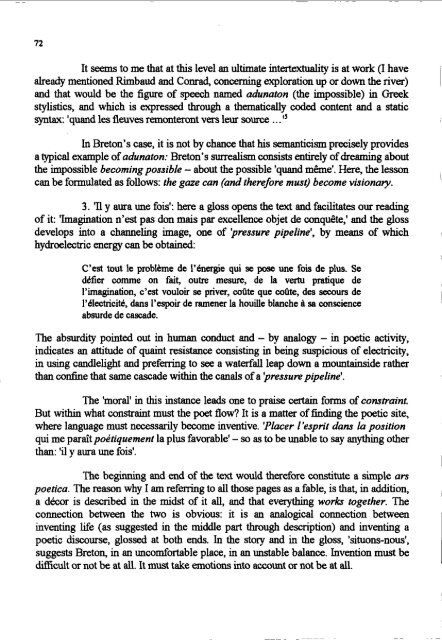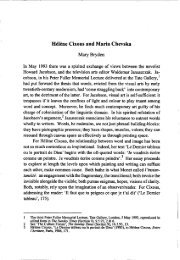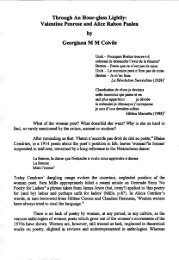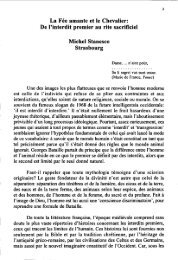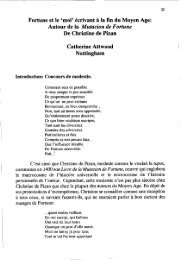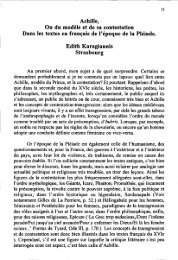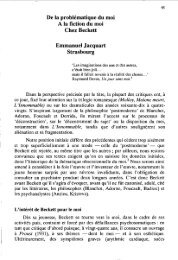The Poetics of Bricolage: André Breton's Theoretical Fables by ...
The Poetics of Bricolage: André Breton's Theoretical Fables by ...
The Poetics of Bricolage: André Breton's Theoretical Fables by ...
You also want an ePaper? Increase the reach of your titles
YUMPU automatically turns print PDFs into web optimized ePapers that Google loves.
72<br />
It seems to me that at this level an ultimate intertextuality is at work (I have<br />
already mentioned Rimbaud and Conrad, concerning exploration up or down the river)<br />
and that would be the figure <strong>of</strong> speech named udunuton (the impossible) in Greek<br />
stylistics, and which is expressed through a thematically coded content and a static<br />
syntax: 'quand les fleuves remonteront vers leur source . . . '<br />
In <strong>Breton's</strong> case, it is not <strong>by</strong> chance that his semanticism precisely provides<br />
a typical example <strong>of</strong> udunaton: <strong>Breton's</strong> surrealism consists entirely <strong>of</strong> dreaming about<br />
the impossible becomingpossible - about the possible 'quand même'. Here, the lesson<br />
can be formulated as follows: the gaze can (und therefore must) become visionary.<br />
3. 'Il y aura une fois': here a gloss opens the text and facilitates our reading<br />
<strong>of</strong> it: 'Imagination n'est pas don mais par excellence objet de conquête,' and the gloss<br />
develops into a channeling image, one <strong>of</strong> 'pressure pipeline', <strong>by</strong> means <strong>of</strong> which<br />
hydroelectric energy can be obtained:<br />
C'est tout le problème de i'énergie qui se pose une fois de plus. Se<br />
défier comme on fait, outre mesure, de la vertu pratique de<br />
l'imagination, c'est vouloir se priver, cotìîe que Coote, des secours de<br />
l'électricité, dans l'espoir de ramener la houilie blanche à sa conscience<br />
absurde de d e .<br />
<strong>The</strong> absurdity pointed out in human conduct and - <strong>by</strong> analogy - in poetic activity,<br />
indicates an attitude <strong>of</strong> quaint resistance consisting in being suspicious <strong>of</strong> electricity,<br />
in using candlelight and preferring to see a waterfall leap down a mountainside rather<br />
than confíne that same cascade within the canals <strong>of</strong> a 'pressure pipeline'.<br />
<strong>The</strong> 'moral' in this instance leads one to praise certain fonns <strong>of</strong> construint.<br />
But within what constraint must the poet flow? It is a matter <strong>of</strong> ñnding the poetic site,<br />
where language must necessanly become inventive. 'Placer 1 'esprit dans lu position<br />
qui me paraît poétiquement la plus favorable' - so as to be unable to say anythmg other<br />
than: 'ii y aura une fois'.<br />
<strong>The</strong> beginning and end <strong>of</strong> the text would îherefore d tute a simple urs<br />
poetica. <strong>The</strong> reason why I am referring to all those pages as a fable, is that, in addition,<br />
a décor is described in the midst <strong>of</strong> it all, and that everythmg worh together. <strong>The</strong><br />
connection between the two is obvious: it is an analogical connection between<br />
inventing life (as suggested in the middle part through description) and inventing a<br />
poetic discourse, glossed at both ends. In the story and in the gloss, 'situons-nous',<br />
suggests Breton, in an uncomfortable place, in an unstable balance. Invention must be<br />
difñcult or not be at all. It must take emotions into account or not be at all.


